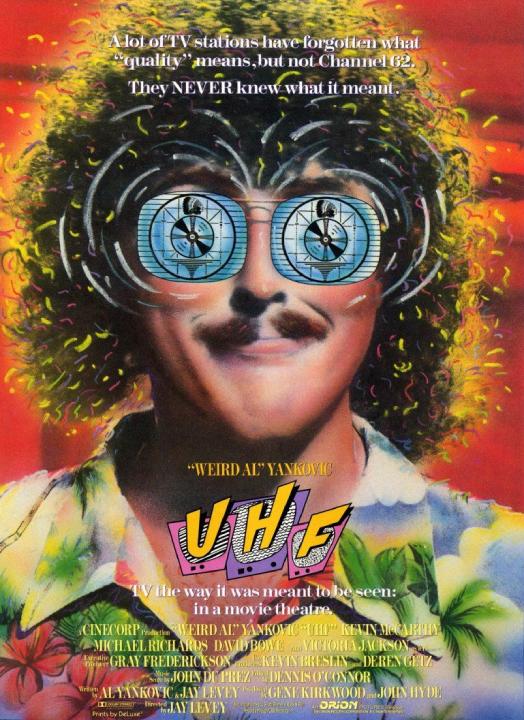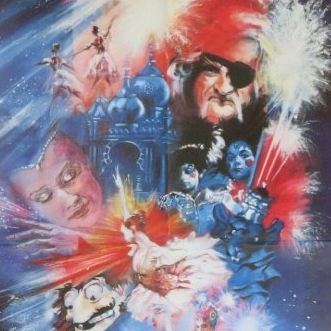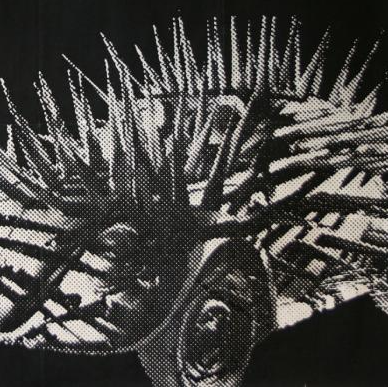UHF
We'll get local broadcasting right where it hurts!

US poster | Orion Pictures
1989 — USA
A CINECORP production, released by ORION PICTURES
Cast: "WEIRD AL" YANKOVIC, KEVIN McCARTHY, MICHAEL RICHARDS, DAVID BOWE and VICTORIA JACKSON
Director: JAY LEVEY
Producers: GENE KIRKWOOD and JOHN HYDE
Executive Producer: GARY FREDERICKSON
Co-Producers: KEVIN BRESLIN and DEREN GETZ
Written by: AL YANKOVIC and JAY LEVEY
Editor: DENNIS O'CONNOR
Cinematography: DAVID LEWIS
Production design: WARD PRESTON
Costume design: TOM McKINLEY
Music: JOHN DU PREZ
© Orion Pictures Corporation
A vehicle for “Weird Al” Yankovic (and that there is probably the only time I’ll bother going all out with correct stylisation in this), UHF was the film that was going to pull Orion Pictures out of their doldrums in the late ‘80s. The beleaguered studio had struck it big a few years earlier, raking in a ton of money from commercial and often critical successes like Robocop (1987), Bull Durham (1988), Platoon and Hannah and her Sisters (both 1986), but weren’t having much luck replicating the success just a couple of years later. The most successful film on their then slate was Bill & Ted’s Excellent Adventure (1989) which was actually made by the DeLaurentiis Entertainment Group, with Orion buying the North American rights on the cheap when DEG was having a fire sale following some exciting bankruptcy times. This is somewhat related; Bill & Ted was apparently a hard sell at first with potential distributors being baffled by the thing, until it did really well with a test audience, at which point they started falling over themselves to buy it. This is related in that UHF, which they did actually fund the production of, also did very well with test audiences, apparently some of the best results that Orion had seen. With that, it was primed for a key summer holiday slot, whereupon it crashed and burned. Oh, well, c’est la vie. Still, it at least apparently made back its production budget, so it wasn’t their biggest disaster of the year. Anyway, yeah, they went bankrupt as well and offloaded a bunch of projects; famously most of the rights to The Addams Family film (1991) were sold to Paramount; and ended up sitting on a bunch of finished ones until their financial woes were dealt with, probably most notably Tony Richardson’s Blue Sky (1994) which only saw light of day just two months shy of three years after his death in ‘91.
UHF follows George Newman (Yankovic), a man prone to daydreaming to such an extent that he has difficulty holding down a job. His uncle (Stanley Brock) wins a nigh worthless local UHF station in a poker game. While his initial intent is to just sell it, his wife (Sue Ane Langdon) thinks the idea of owning their own TV station sounds like a lark and also it would provide a job for their nephew where his imagination could prove an asset. And so, George is appointed station manager. Feeling that the problem is that the station is mostly peddling in reruns from the ‘60s, he decides that its fortunes could be turned around by making original programming. This is apparently to no avail and getting swept up in this inevitably for this sort of plot results in his relationship with his girlfriend (Victoria Jackson) suffering. Despondent, he abandons a children’s show that he’s meant to be hosting partway through, leaving it in the hands of the oddball janitor, Stanley (Michael Richards). In fact, the resulting show quickly becomes a hit, with Stanley’s earnest strangeness endearing him to children and adults alike. Seeing this, George figures that perhaps other local enthusiastic weirdos might appeal to audiences. This all leads to the station coming to rival the leading network affiliated station in the local ratings, raising the ire of its owner, the nefarious R.J. Fletcher (Kevin McCarthy), who decides that something must be done about this upstart.
So, yes, this premise is rather steeped in how the American television landscape works and doesn’t really translate all that well to its British counterpart. While the main over-the-air networks (with the quasi-exception of ITV; I’ll get to that) in the UK program the entire day’s schedule with have some slots for regional opt outs and deal with the whole thing pretty much entirely by themselves, in the US (and some other countries; I believe Canada also does it like this) the OTA landscape is largely based around independent local stations which will often affiliate with one of the big national networks for said network to provide them with their original programming for the peak viewing hours (usually starting at 8pm and ending at 11pm) and some maybe some other key timeslots, with the station left on its own to figure out how to fill the other eighteen or however many hours of the daily schedule. (That said, a lot of local stations are actually owned by if not the network itself then a sister company thereof.) The closest comparison really is how ITV used to work before they got rid of much of the regulation, but it’s still not really accurate as that was built around the various independents making their own programming and selling them between each other; that is, I believe, more akin to how American public service broadcaster PBS’ stations do it, whereas for most stations it’s based around padding out the schedules with infomercials and teleshopping and reruns of old shows which are naturally more expensive for more recent and/or popular ones thus being more affordable to the stations that are doing better financially, such as the network owned or affiliated one. Long story short here, being an unaffiliated local station is essentially being at the bottom of the broadcasting ladder. (Of course, with the rise of cable and streaming and all that, even the networks are much weaker than they once were; presumably it’s even worse for the few remaining UHF stations.)
How important is it that you understand this side of American broadcasting? Eh, honestly probably not all that much. In many ways, the plot of this film is just an excuse to string skits together. I suppose it does at least have one, unlike its contemporary-ish local TV themed sketch film, Amazon Women on the Moon (1987). I suppose the obvious point of comparison in that case would be something like The Muppet Show (1976-1981) (or perhaps even more relevantly its exciting failed revivals, probably the best known of which being Muppets Tonight (1996-1998), which revolve around the Muppets trying to make television rather than put on a vaudeville show), wherein there’s sitcomy backstage plot about the crew and performers and that which is interspersed with sketches that represent what the audience is seeing. Hmm, as apt as it might be, I fear that comparing this film to the Muppets probably does it no real favours, because while the plots of episodes of the various Muppet series are somewhat key to the enduring legacy and appeal of the characters, here it really does just seem like a loose thing to hang the sketches on. The characters are all pretty basic in their definition so it’s difficult to care too much about what’s actually happening to them; while I found Yankovic decently charming as the naïve dreamer type, no one else is sketched out quite so much, and god knows he’s done pretty broadly. The film does just enough to make you more or less invested in seeing his story play out, but it’s all rather perfunctory.
That particular weakness of the film is pretty well acknowledged. Yankovic says that he felt in retrospect, after the film’s initial failure at the box office, that they probably should have gone the route of just stringing a bunch of sketches together
à la
The Kentucky Fried Movie (1977) and its ilk, though not so much anymore as the film’s growing cult fanbase seems to have embraced the story side. In truth, the rather hackneyed plot holding the whole thing together is probably what helps the thing stand out, giving an emotional hook in the form of this Walter Mitty-esque character and having something to cling onto even when the jokes don’t land, as well as helping give an air of wholesomeness to the silliness that said sketch films tend to lack (unlike most, there’s not all that much to potentially object to). The skits are, perhaps inevitably, a bit inconsistent. While certainly it doesn’t have the lows of many sketch films and definitely has some highs, I’m not sure there are enough to really class this as a secret masterpiece; for me, it’s mostly just at an ‘eh, that’s kinda funny’ level. The more human element is, I’d guess, key to the film’s appeal. It’s largely just fairly affable and has some pleasant commentary on the nature of community and all that. And also Kevin McCarthy’s massive hamming it up.
At time of writing, UHF is available to rent off of Amazon and Youtube, amongst other services. I recommend JustWatch for keeping up with where films are streaming (including this one!). Alternatively, physical copies are reportedly available for rent via Cinema Paradiso.
The film presently has a PG rating (last being submitted in 2003). The predates the BBFC's consumer advice appearing on their site; one assumes it's because the film has a scene featuring some cartoonish comedy bloodshed (which is reportedly why it ended up with a PG-13 rating in the US). It's rather Pythonesque and I've honestly seen worse even at the PG level. What might be more iffy by modern standards is a) one of the citizens that gets involved with the station being a karate instructor who speaks in the stereotypical chop-socky style, and b) one of the sketches has brown face going on.
Sources
Harris, W., 2014. 'An Oral History of "Weird Al" Yankovic's UHF', The Dissolve. [online] Available at: <https://thedissolve.com/features/oral-history/817-an-oral-history-of-weird-al-yankovics-uhf/?page=all> [Accessed 16 April 2021].
O'Neal, S., 2015. 'We got it all on UHF: An oral history of "Weird Al" Yankovic's cult classic', The A.V. Club. [online] Available at: <https://film.avclub.com/we-got-it-all-on-uhf-an-oral-history-of-weird-al-yan-1798278657> [Accessed 16 April 2021].
Rabin, N., 2016. 'The Fractured Mirror – Entry #8: Hollywood Shuffle', TCM Backlot. [online] Available at: <https://www.tcmbacklot.com/blog/inside-hollywood/fractured-mirror-hollywood-shuffle> [Accessed 16 April 2021].
Tobias, S., 2012. 'Weird Al's UHF is uneven, but that just made it ahead of its time', The A.V. Club. [online] Available at: <https://film.avclub.com/weird-al-s-uhf-is-uneven-but-that-just-made-it-ahead-o-1798231770> [Accessed 16 April 2021].



